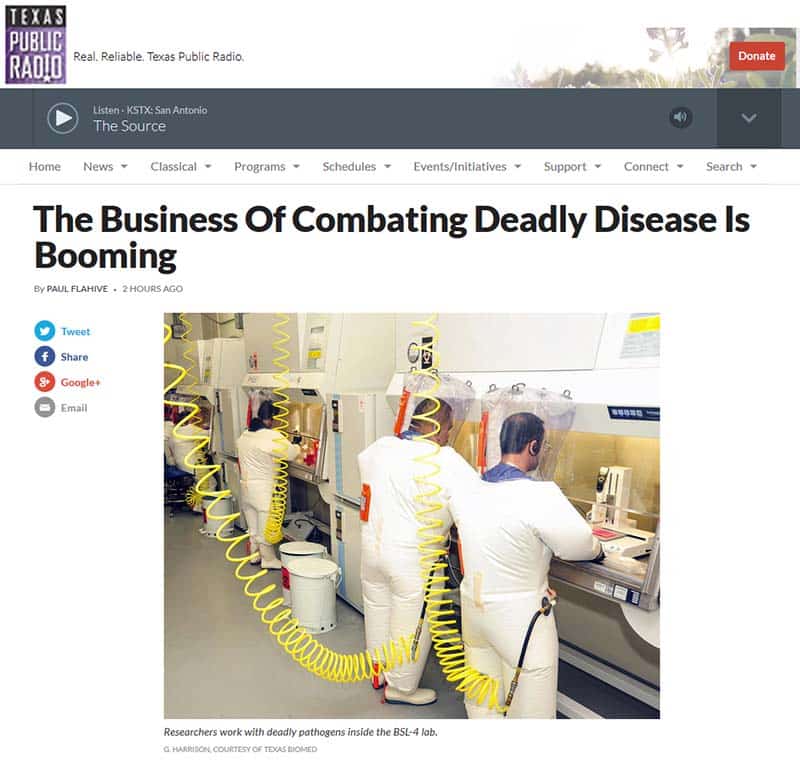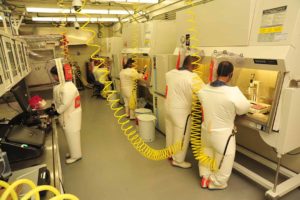Texas Biomed to Expand High Containment Research Capabilities
New BSL-4 laboratory will increase capacity to meet growing demand for research into diseases like Ebola, Marburg and Lassa Fever

San Antonio, Texas (June 19, 2017) – Recognizing that risks posed by current and emerging infectious diseases are real and growing and that the international scientific community is racing against time to combat these growing threats, Texas Biomedical Research Institute’s Board of Trustees has approved moving forward with the design and construction of a new biosafety level 4 facility, with timing and scope to be determined.
Developing vaccines and therapies for the world’s deadliest infections for which there are none currently (including the growing resistance of these infectious pathogens to current treatments) requires expertise in working under maximum safety precautions inside a laboratory designed for the isolation of dangerous biological threats. Texas Biomed has a longstanding history of high-quality, high-containment research with proven capabilities and expertise, as well as the flexibility and agility to respond to growing infectious disease research needs. Texas Biomed’s BSL-4 laboratory is the only privately owned BSL-4 laboratory in the United States.
“The Institute’s current biosafety level 4 laboratory, which is the highest safety level laboratory that allows for the study of the world’s deadliest pathogens, must expand if we are to meet the growing demands for discovering more effective diagnostics, therapies and vaccines for these infections,” said Texas Biomed President and CEO Dr. Larry Schlesinger.
The vote by the Board of Trustees moves the Institute closer to the design phase of the project. The scope and timing of the expansion, as well as overall financial investment will be established based on design and construction assessments, as well as input from potential public and private partners.

Expansion of the BSL-4 laboratory will be part of a larger strategic and master planning effort the Institute will undergo this year. Dr. Schlesinger, himself an infectious disease researcher in tuberculosis, took the helm of Texas Biomed May 31 and sees the expansion of high containment laboratory space as necessary for the continued growth and success of the Institute.
“There is no doubt that current strengths lie in the infectious diseases arena and thematic program areas will likely revolve around these strengths, incorporating cutting edge associated disciplines and platforms,” Dr. Schlesinger said.
As the 2014 Ebola virus outbreak and the more recent Zika virus outbreak has shown, scientific discovery has not kept pace with emerging pathogens, and investment in basic biomedical science is critical. At least 25% of the approximate 60 million annual deaths in the world are due to infectious diseases. The threat posed by current and emerging infectious diseases is real and growing.
“Proactive and continuous research toward the development of countermeasures is critical to both our national health and security,” said Dr. Jean Patterson, Texas Biomed Scientist and Chair of the BSL4 Task Force. “Texas Biomed’s current Biosafety level 4 laboratory is operating at maximum capacity with an active pipeline for the next 2-plus years and is the only private organization providing a simple, efficient model with the flexibility to rapidly respond to priority research needs. It is an established program with a strong emphasis on high quality research interfacing with both government agencies and pharmaceutical companies.”
In the past decade, Texas Biomed has contributed significantly to the understanding of infectious diseases. For example, the team has demonstrated efficacy of a live vaccine for Lassa Hemorrhagic Fever virus. The team has identified new inhibitors of Ebola virus disease in systematic screenings of FDA-approved drugs. Additionally, the team identified a viral component that is important for Ebola virus replication and could serve as a potential target for antiviral therapy. This finding was selected by the National Institutes of Health as a top discovery in 2015. The institute is also making major advances in new therapies and vaccines for HIV, malaria and tuberculosis, combined accounting for the majority of human suffering and death due to infections worldwide.
Expanding the BSL-4 laboratory and its capabilities will allow Texas Biomed to continue to recruit extraordinary scientists, increase research dollars and further establish San Antonio’s position as a world-wide leader in biomedical research.
###
About Texas Biomedical Research Institute
Texas Biomed is one of the world’s leading independent biomedical research institutions dedicated to advancing health worldwide through innovative biomedical research. Texas Biomed partners with hundreds of researchers and institutions around the world to develop vaccines and therapeutics against viral pathogens causing AIDS, hepatitis, hemorrhagic fevers and parasitic diseases responsible for malaria and schistosomiasis. The Institute also has programs in the genetics of cardiovascular disease, diabetes, obesity, psychiatric disorders and other diseases. The Institute is home to the Southwest National Primate Research Center (SNPRC), which provides broad services in primate research and hosts research programs in regenerative medicine and aging, lifestyle disorders and infectious diseases. SNPRC contributes to a national network of National Primate Research Centers (NPRCs) with specialized technologies, capabilities and primate resources. For more information on Texas Biomed, go to www.TxBiomed.org.